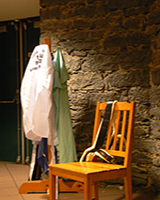 |
|
|
|



The Regroupement des ressources alternatives en santé mentale du Québec (RRASMQ)1 is a non-profit coalition with over a hundred community-based organizations spread throughout the province of Quebec.
The RRASMQ’s mission is to foster the development of diverse alternative practices in mental health, and support the mental health community movement.
The member organizations of the RRASMQ, also known as alternative resources, are made up of people with lived experience and workers, and include peer support groups, crisis centers, transition houses, treatment centers, hot lines, etc. These resources adhere to the alternative philosophy of the mental health movement in Quebec, and are its leaders.
1The Coalition of alternative resources in mental health in Quebec
Originally, the RRASMQ contested the abuses and limited treatment choices offered in psychiatry. It is at the origin of a movement to empower people with lived experience, and espouses a new vision of so-called mental health issues.
It arose at the end of the 1970s after the waves of deinstitutionalization. Quebec’s alternative movement in mental health was inspired by the North American movements of anti-psychiatry and survivors which put into question the dominance of the biomedical model of psychiatry.
The RRASMQ was launched in 1983 by an alliance of service users, alternative community groups and advocacy groups in mental health. These pioneers shared and proposed a positive view of mental health, different approaches than psychiatry. People with lived experience were deemed to have the right to a legitimate place in society.
The RRASMQ was developed around a vision that contested the biomedical model and its emphasis on pathology and deficits. Over the years, the alternative identity grew and evolved from the practices and approaches that emerged from the alternative resources.
The Alternative is first and foremost a philosophy, another way of looking at mental health issues, and of perceiving people with lived experience.
The Alternative is also a common attitude of respect for people with lived experience, their own story and reality through a positive and non-pathological view of mental health.
The Alternative is based on the belief that solidarity between individuals and participation in a community contributes to well-being. The Alternative also believes that all communities have the potential for the self-actualization of its members.
The Alternative calls into question the biomedical culture of mental health, which considers disease more than health. It remains critical of medical knowledge, its models of rehabilitation, and the treatments used in psychiatry.
The Alternative questions the social culture that emphasizes performance and productivity of individuals. The Alternative is part of the autonomous community movement.
"Elsewhere and Otherwise" (“Ailleurs et Autrement”) is the original slogan of the alternative mental health movement in Quebec. It is inspired by the discourse of supporters of deinstitutionalization, and refers to a willingness to develop resources elsewhere than in asylums, and practices different from those of psychiatric institutions.
Here is a list of the alternative resources who offer bilingual services:
| Action Autonomie |
3958 Dandurand Montréal (Québec) H1X 1P7 |
Téléphone : 514-525-5060 Site Internet : www.actionautonomie.qc.ca/ |
| Alternative Centregens |
462 boulevard Ste-Foy Longueuil (Québec) J4J1Y2 |
Téléphone : 450-651-0651 Site Internet : www.centregens.ca |
| Ancre et Ailes |
10, rue Bridge, C .P. 102 Orsmtown (Québec) J0S 1K0 |
Téléphone : 450-829-3491 Site Internet : www.ancreetailes.com |
| Le Rivage du Val Saint-François |
423, rue Principale Nord Richmond (Québec) J0B 2H0 |
Téléphone : 819-826-5303 Site Internet : www.le-rivage.org |
| Maison sous les arbres |
2, boulevard d'Anjou Châteauguay (Québec) J6K 1B7 |
Téléphone : 450-691-8882 Site Internet : www.la-msla.com |
| Projet PAL |
861, rue De L'Église Verdun (Québec) H4G 2N3 |
Téléphone : 514-767-4701 Site Internet : www.projetpal.com |
You can download for free the following GAM guides and articles in English:
♦ Other articles, research, these are also written in French, Portuguese, Spanish and Japanese.
|
Retour à l'accueil ▪ Plan du site |